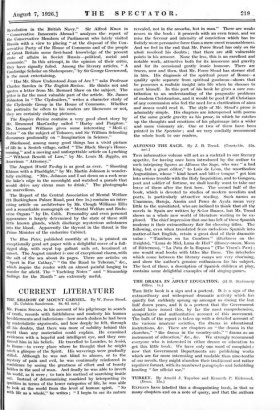Tins informative volume will act as a cocktail to our
literary appetite, for having once been introduced by the author to such intriguing figures as Alfonso the Sage, who was " a bad king, but a great editor," to Luis de Leon, the unorthodox Augustinian, whose " kind heart and bitter tongue " got him into serious trouble with the Holy Inquisition, and to Gongora, poet and soldier of fortune, we shall hardly want to take our leave of them after the first bow. The second half of the book, which is devoted to studies of modern novelists and poets, is particularly attractive reading. Such names as Unamuno, Baroja, Azorin and Perez de Ayala. mean very little to the uninitiated, who are inclined to think that all the novels in Spain are written by Senor Ibanez, but Mr. Trend shows us a whole new world of literature waiting to be ex- plored. The chief impression that one has left of these Spanish moderns is their extraordinary flair for choosing titles. The following, even when translated from melodious Spanish into matter-of-fact English, retain a great deal of their dramatic value : " Tiniebras en las Cumbres " (Darkness on the Heights), "Luna de Mid, Luna de Hid" (Honey-moon. Moon of Bitterness), " La Pata de la Raposa " (The Vixen's Paw) ; one would read books with titles like these. The interludes which come between the literary essays are very charming, and show the author's genuine enthusiasm for his subject. The best of these, a description of Spanish children at play, contains some delightful examples of old singing-games.






































 Previous page
Previous page